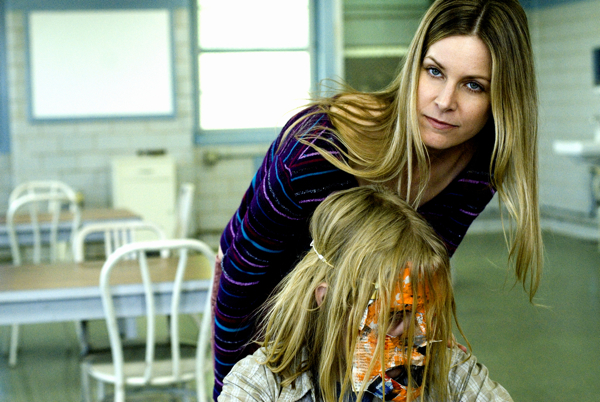Movie review by Greg Carlson
Remaking, or as the studio would have it, “re-imagining,” a contemporary classic horror movie might win a generation of new fans, but for those old enough to remember John Carpenter and Debra Hill’s superior version of “Halloween,” Rob Zombie’s take doesn’t quite measure up. There is no question that the rocker-turned-auteur has a genuine affection, even reverence, for the most derided film genre, but like his earlier movies, “Halloween” loses focus during its too-long final third. Additionally, this contemporary re-working of the horror staple routinely tumbles into the “more is more” camp, with an unnecessary backstory and explanations that take all the mystery and fun out of the legend.
Like the recent remake of “Black Christmas,” Zombie’s version of “Halloween” aims to leave no exposition unexplored. Excruciatingly detailing the family history and origin of unstoppable bogeyman Michael Myers, played this time as a child by Daeg Faerch and as an adult by Tyler Mane, the new “Halloween” spends too much time checking off a list of the requisite serial killer tropes in young Michael’s life, from harming animals to sexual dysfunction to relentless suffering at the hands of bullies. The Halloween evening massacre is presented with plenty of bloody detail, which will please the gore hounds at the same time it disappoints those who favor suspense over shock.
Zombie shows more restraint than he did in “House of 1000 Corpses” and “The Devil’s Rejects,” but that is not saying much. As a director, he appears to relish the extended climax, and “Halloween” suffers from a flabby, predictable endgame that might have been excised altogether. Most unfortunate is the director’s inability to infuse the script with vivid characters. Laurie Strode (Scout Taylor-Compton), indistinguishable from either of the other two female characters who are supposed to be her close friends, is flatly written. Taylor-Compton proves that she has powerful enough lungs to pass the scream test, but the movie sorely lacks the spark provided by the likes of Jamie Lee Curtis, P.J. Soles, and Nancy Loomis.
Malcolm McDowell, replacing Donald Pleasance in the Dr. Sam Loomis role, struggles mightily to make his execrable dialogue sound halfway intelligent. Zombie had a genuine opportunity to deepen the themes that made Loomis a figure of light to Michael’s shadow, but McDowell is mostly wasted, fulfilling the routine slasher flick slot of the modern day Cassandra, warning the non-believers that terrible things are afoot. Zombie does make certain, however, that Loomis is shown to sympathize with the hulking murderer, a good choice rarely explored in horror since the days of Karloff as Frankenstein’s Monster.
It is the director’s sympathy with Michael that operates as the movie’s paradoxical strength and its Achilles’ heel. Zombie’s strenuous efforts to humanize and account for Michael’s inexcusable behavior don’t mix with the shocking body count tallied by the masked creep. Late in the movie, there is an interesting moment when Michael is shown to reach out to another character in an emotional acknowledgment of his past. Predictably, the connection isn’t made, and he quickly resumes his relentless, machine-like killing. Had Rob Zombie wanted to really expand the character, that scene should have had a different outcome.
